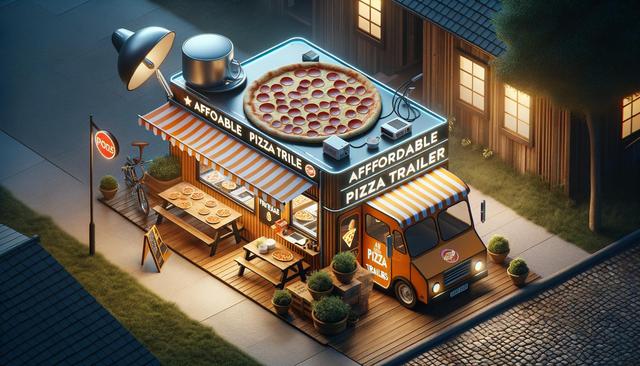What Influences the Cost of a Pizza Trailer?
When considering the launch of a mobile pizzeria, one of the first steps is to understand the cost of affordable pizza trailers. Several factors influence the overall price, and knowing these can help you estimate your budget more accurately. Typically, the size of the trailer, the type of oven installed, and the level of customization play critical roles in determining cost.
For example, a basic pizza trailer with limited equipment might start around $20,000, while a more advanced setup with a wood fired pizza oven, refrigeration, and prep stations can easily exceed $50,000. The build quality and materials used also contribute significantly to pricing. Stainless steel surfaces and durable flooring will increase durability and cost but may reduce maintenance expenses in the long run.
Other cost factors include:
- Brand new vs. used trailers
- Local regulations and compliance requirements
- Customization and branding additions
- Appliance quality and energy efficiency
Overall, understanding what goes into the pricing of a pizza food trailer sets you up for smarter investment decisions.
Comparing Different Types of Pizza Trailers
Not all pizza trailers are built the same, and the type you choose can affect both your startup budget and business model. A wood fired pizza trailer, for instance, offers a unique appeal and traditional flavor that some customers may prefer. However, these trailers often require more space and ventilation, which can increase both the cost and complexity of operation.
In contrast, standard mobile pizza trailers with electric or gas ovens are generally more compact and easier to operate in a wider range of environments. They are often less expensive upfront and simpler to maintain. When browsing for a pizza trailer for sale, it’s important to compare the pros and cons of each type against your operational needs and customer expectations.
Key types of pizza trailers include:
- Basic prep and oven trailers
- Fully equipped pizza food trailers with refrigeration and sinks
- Custom-built wood fired pizza trailers
- Compact mobile pizza trailers designed for events
Each option comes with its own price range and benefits, so aligning your choice with your business goals is essential.
New vs. Used Pizza Trailers: Which Is Right for You?
If you’re trying to keep your initial investment low, deciding between a new or used pizza food trailer can significantly impact your budget. New trailers offer the advantage of modern equipment, warranty coverage, and full customization. However, they come at a higher cost, which might stretch your budget if you’re just starting out.
Used pizza trailers, on the other hand, can be a cost-effective way to enter the mobile food market, especially if you find a well-maintained unit. These can range from lightly used models with minimal wear to older trailers that may require refurbishment. Always inspect used trailers carefully or have a professional evaluate them to avoid hidden repair costs.
Consider the following when evaluating a used pizza trailer for sale:
- Condition of cooking equipment and safety systems
- Compliance with local health and safety standards
- Space layout and workflow efficiency
- Repair and upgrade costs
Balancing upfront savings with potential future expenses is key when choosing between new and used options.
Customization and Equipment: How They Affect Price
Customization plays a big role in how much you’ll ultimately pay for your mobile pizza trailer. Standard units may come with basic shelving and an oven, but more elaborate builds include refrigeration, prep counters, water systems, and even digital menu displays. Each addition boosts functionality but also adds to the cost.
For instance, adding a high-quality wood fired oven can enhance flavor and attract customers, but it may also require structural reinforcement and additional ventilation. Similarly, including a full sink setup for health code compliance is another cost to factor in. When budgeting, it’s helpful to differentiate between essential and optional features.
Common customizable options include:
- Oven type (wood fired, electric, gas)
- Exterior design and branding
- Interior layout and materials
- Power supply and water systems
By focusing on features that directly impact your service quality and efficiency, you can keep costs reasonable without sacrificing performance.
Long-Term Value and ROI of Pizza Trailers
While startup costs are important, it’s equally crucial to consider the long-term value of your investment in a pizza food trailer. A well-built trailer can serve your business for years, especially if you perform regular maintenance and choose durable equipment. The ability to attend events, set up in multiple locations, and build a loyal customer base adds to the return on investment over time.
Mobile pizza trailers offer flexibility that can reduce overhead compared to a fixed-location restaurant. This makes them attractive for entrepreneurs testing a new concept or expanding into catering and event services. The key to maximizing ROI is strategic planning—choosing a trailer that fits your operational needs and financial goals.
Ways to increase long-term value include:
- Investing in durable, easy-to-clean materials
- Maintaining equipment regularly
- Adapting your menu to customer preferences
- Choosing high-traffic locations for setup
Understanding both short- and long-term costs helps ensure your pizza trailer remains a profitable asset for years to come.
Conclusion: Planning Smart with Your Pizza Trailer Investment
Launching a mobile pizza business starts with understanding the cost of affordable pizza trailers and making informed choices based on your goals. Whether you’re exploring a pizza trailer for sale or designing a custom wood fired pizza trailer, careful evaluation of your needs and budget will guide you to the right solution. From comparing equipment to weighing new versus used options, each step in the decision-making process influences your potential for success. With the right mobile pizza trailer and a well-thought-out plan, you can build a sustainable and flexible food business that brings value to both your customers and your bottom line.








